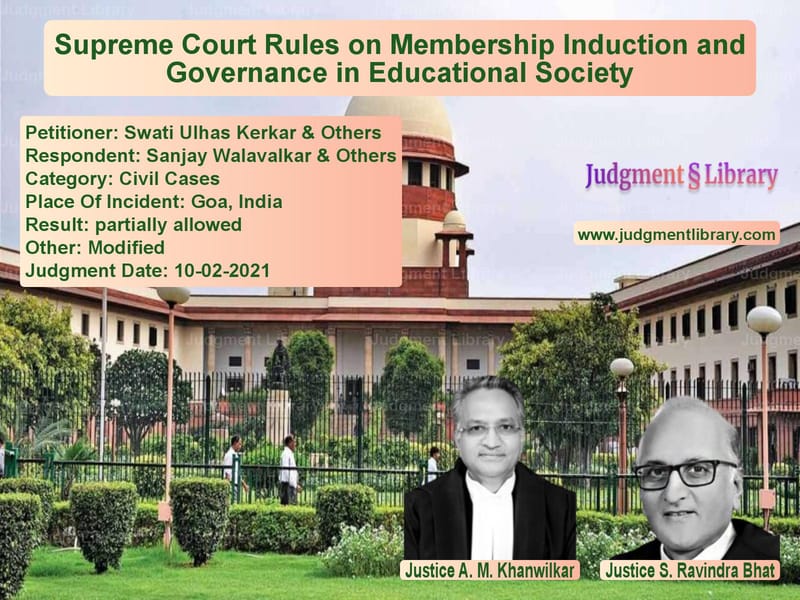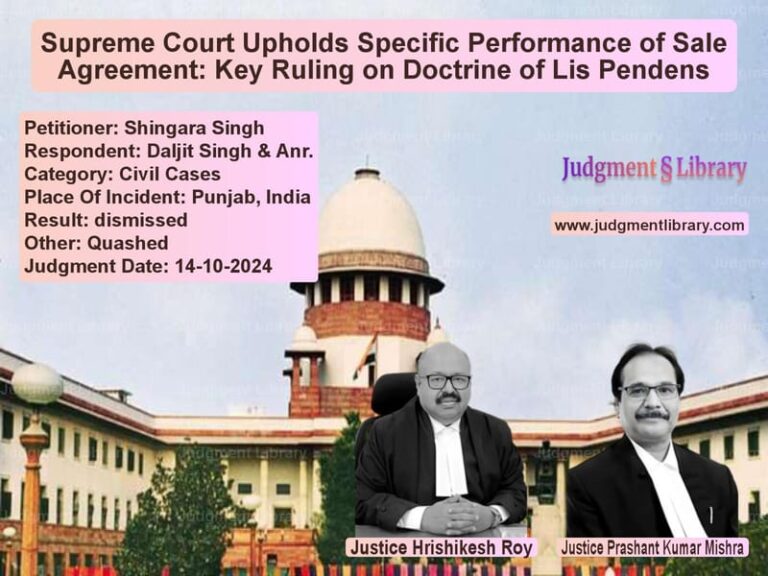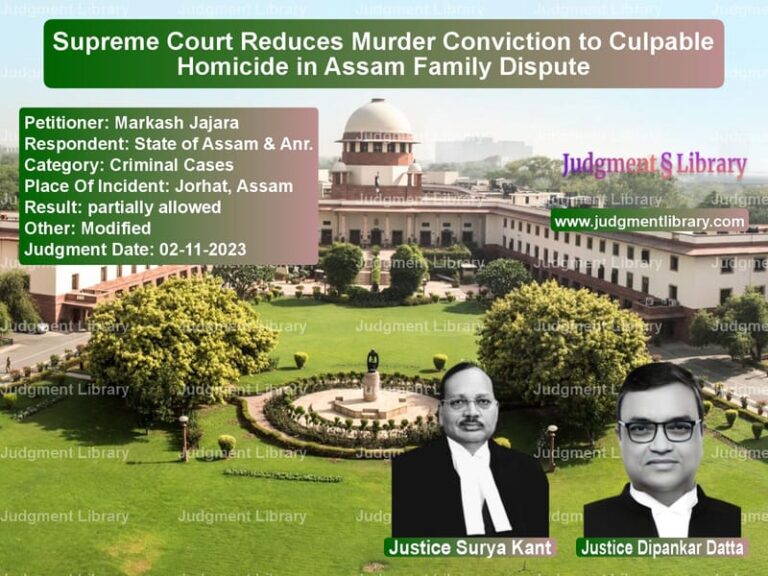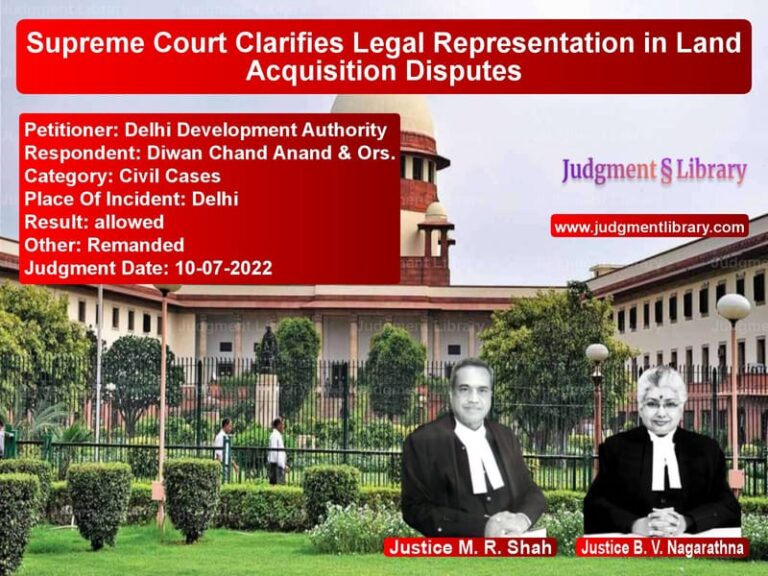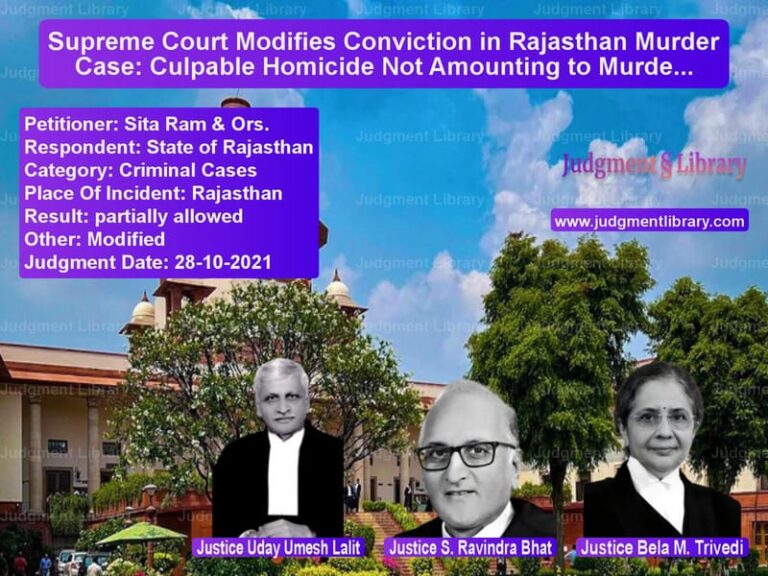Supreme Court Rules on Membership Induction and Governance in Educational Society
The Supreme Court of India recently ruled in Swati Ulhas Kerkar & Others vs. Sanjay Walavalkar & Others, addressing a contentious issue surrounding the membership induction in an educational society. The Court examined whether the decision to invalidate memberships of several individuals was legally sound and whether it was driven by procedural irregularities or political motives.
Background of the Case
The dispute arose from the induction of 22 new members into the Prabodhan Education Society by an outgoing managing committee that was facing a no-confidence motion. The induction was challenged on the grounds that it was an attempt to influence the composition of the society and maintain control over its decision-making processes. The Registrar of Societies and the Bombay High Court ruled that the membership induction was arbitrary and invalid, leading to an appeal before the Supreme Court.
Petitioner’s (Swati Ulhas Kerkar & Others) Arguments
The petitioners, who were among the newly inducted members, argued that:
- They had fulfilled all the eligibility requirements under the society’s bye-laws.
- Their membership was revoked without due process and without giving them an opportunity to present their case.
- The principle of open membership should apply, as the society was not a cooperative society but an educational institution governed by a different set of laws.
- The ruling in Vipulbhai M. Chaudhary, which was cited by the respondents, was inapplicable because it pertained to cooperative societies and not educational institutions.
- Their exclusion from the society’s membership violated principles of fairness and natural justice.
Respondent’s (Sanjay Walavalkar & Others) Arguments
The respondents, who were part of the newly constituted managing committee, countered by asserting that:
- The outgoing managing committee had inducted the new members as a strategic move to retain control over the society.
- The membership induction was conducted without following proper procedures, making it arbitrary and void.
- The Registrar of Societies and the High Court had rightly ruled against the induction, as it undermined democratic principles and governance.
- The decision to invalidate the memberships was not based on personal bias but was necessary to uphold the integrity of the institution.
Supreme Court’s Observations
The Supreme Court bench, comprising Justices A. M. Khanwilkar and S. Ravindra Bhat, made the following key observations:
- The induction of members by an outgoing committee under a cloud of no-confidence raises legitimate concerns about procedural fairness.
- Membership in a society must be conferred through a transparent and well-documented process to avoid any suspicion of bias or undue influence.
- While societies are autonomous in their governance, their decisions must adhere to the principles of natural justice and due process.
- The High Court’s decision to invalidate the memberships was justified, as it sought to prevent manipulation of society governance.
- However, the newly constituted managing committee should consider fresh applications from the petitioners and assess their eligibility without bias.
The Court emphasized:
“The decision to induct members must be exercised in a bona fide manner, keeping in mind the larger interest of the society. Procedural irregularities that undermine democratic principles cannot be condoned.”
Final Judgment
The Supreme Court ruled:
- The High Court’s ruling invalidating the membership induction was upheld.
- The petitioners were allowed to reapply for membership, and their applications must be reviewed on merit.
- The managing committee was directed to ensure transparency and fairness in considering new applications.
- The appeal was partially allowed, ensuring that the petitioners had a fair opportunity to seek membership without procedural bias.
Impact of the Judgment
This ruling has significant implications for governance in educational societies and other member-based institutions:
- Ensuring Fairness in Membership Induction: The decision reinforces the importance of adhering to procedural norms when inducting new members.
- Preventing Manipulation in Society Governance: It sets a precedent against the misuse of membership induction as a tool for retaining control over institutions.
- Application of Natural Justice Principles: The ruling emphasizes that individuals must be given a fair opportunity to present their case before any adverse action is taken.
- Clarification on Applicability of Legal Precedents: The judgment distinguishes between cooperative societies and educational societies, ensuring that legal principles are applied in the appropriate context.
Conclusion
The Supreme Court’s ruling in Swati Ulhas Kerkar & Others vs. Sanjay Walavalkar & Others upholds the principles of fairness, transparency, and due process in the governance of educational societies. By ensuring that the membership induction process is free from undue influence and political maneuvering, the judgment strengthens democratic functioning within such institutions.
This ruling provides a framework for other societies and organizations to follow when inducting members, ensuring that governance remains fair and accountable to its stakeholders.
Petitioner Name: Swati Ulhas Kerkar & Others.Respondent Name: Sanjay Walavalkar & Others.Judgment By: Justice A. M. Khanwilkar, Justice S. Ravindra Bhat.Place Of Incident: Goa, India.Judgment Date: 10-02-2021.
Don’t miss out on the full details! Download the complete judgment in PDF format below and gain valuable insights instantly!
Download Judgment: swati-ulhas-kerkar-&-vs-sanjay-walavalkar-&-supreme-court-of-india-judgment-dated-10-02-2021.pdf
Directly Download Judgment: Directly download this Judgment
See all petitions in Contract Disputes
See all petitions in Property Disputes
See all petitions in Succession and Wills
See all petitions in Judgment by A M Khanwilkar
See all petitions in Judgment by S Ravindra Bhat
See all petitions in partially allowed
See all petitions in Modified
See all petitions in supreme court of India judgments February 2021
See all petitions in 2021 judgments
See all posts in Civil Cases Category
See all allowed petitions in Civil Cases Category
See all Dismissed petitions in Civil Cases Category
See all partially allowed petitions in Civil Cases Category

